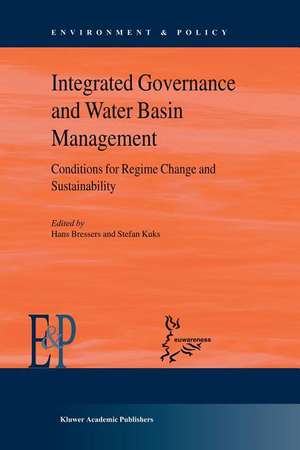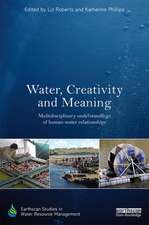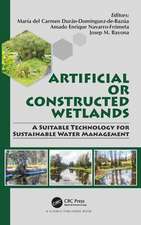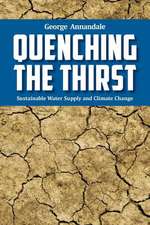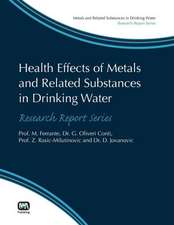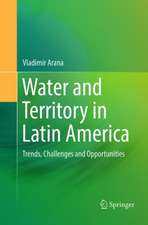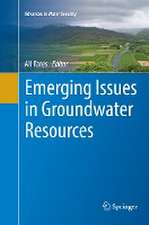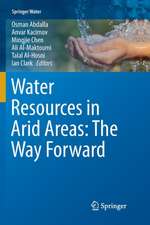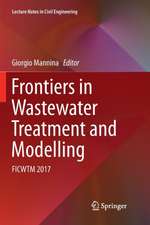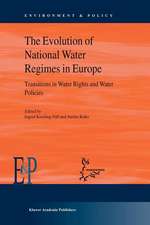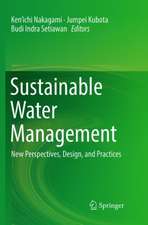Integrated Governance and Water Basin Management: Conditions for Regime Change and Sustainability: Environment & Policy, cartea 41
Editat de Stefan Kuks, Hans Bressersen Limba Engleză Paperback – 4 dec 2010
This book examines water management integration in the Netherlands, Belgium, France, Spain, Italy and Switzerland. It is based on the European research project EUWARENESS. Per country two case studies are considered, to analyze specific regime transitions at water basin level during the last decades. The twelve case studies are discussed within their national context and compared on conditions that are important for regime change towards sustainability. The book also provides theory on water governance, institutional regimes, and property rights, resulting in a tool for monitoring the progress of integrated water management at the basin level in EU member states or other countries.
This book follows another volume published with Kluwer Academic Publishers on "The Evolution of National Water Regimes in Europe", edited by Ingrid Kissling-Näf and Stefan Kuks.
| Toate formatele și edițiile | Preț | Express |
|---|---|---|
| Paperback (1) | 634.56 lei 6-8 săpt. | |
| SPRINGER NETHERLANDS – 4 dec 2010 | 634.56 lei 6-8 săpt. | |
| Hardback (1) | 641.36 lei 6-8 săpt. | |
| SPRINGER NETHERLANDS – 30 noi 2004 | 641.36 lei 6-8 săpt. |
Din seria Environment & Policy
- 18%
 Preț: 777.90 lei
Preț: 777.90 lei - 15%
 Preț: 636.50 lei
Preț: 636.50 lei -
 Preț: 402.77 lei
Preț: 402.77 lei -
 Preț: 404.03 lei
Preț: 404.03 lei - 15%
 Preț: 637.13 lei
Preț: 637.13 lei - 18%
 Preț: 948.03 lei
Preț: 948.03 lei - 18%
 Preț: 937.85 lei
Preț: 937.85 lei - 15%
 Preț: 645.40 lei
Preț: 645.40 lei - 18%
 Preț: 945.86 lei
Preț: 945.86 lei - 15%
 Preț: 637.96 lei
Preț: 637.96 lei - 18%
 Preț: 1218.29 lei
Preț: 1218.29 lei - 18%
 Preț: 1217.84 lei
Preț: 1217.84 lei - 15%
 Preț: 637.46 lei
Preț: 637.46 lei - 15%
 Preț: 636.80 lei
Preț: 636.80 lei - 15%
 Preț: 638.75 lei
Preț: 638.75 lei -
 Preț: 382.42 lei
Preț: 382.42 lei - 20%
 Preț: 333.05 lei
Preț: 333.05 lei - 15%
 Preț: 636.17 lei
Preț: 636.17 lei - 15%
 Preț: 633.74 lei
Preț: 633.74 lei - 15%
 Preț: 631.45 lei
Preț: 631.45 lei - 18%
 Preț: 934.56 lei
Preț: 934.56 lei - 18%
 Preț: 939.58 lei
Preț: 939.58 lei - 18%
 Preț: 938.33 lei
Preț: 938.33 lei - 18%
 Preț: 941.30 lei
Preț: 941.30 lei - 18%
 Preț: 952.12 lei
Preț: 952.12 lei - 18%
 Preț: 950.38 lei
Preț: 950.38 lei - 18%
 Preț: 948.65 lei
Preț: 948.65 lei - 15%
 Preț: 635.20 lei
Preț: 635.20 lei
Preț: 634.56 lei
Preț vechi: 746.54 lei
-15% Nou
Puncte Express: 952
Preț estimativ în valută:
121.53€ • 125.21$ • 101.80£
121.53€ • 125.21$ • 101.80£
Carte tipărită la comandă
Livrare economică 22 februarie-08 martie
Preluare comenzi: 021 569.72.76
Specificații
ISBN-13: 9789048166664
ISBN-10: 9048166667
Pagini: 284
Ilustrații: XIV, 269 p. 25 illus.
Dimensiuni: 155 x 235 x 15 mm
Greutate: 0.39 kg
Ediția:Softcover reprint of hardcover 1st ed. 2004
Editura: SPRINGER NETHERLANDS
Colecția Springer
Seria Environment & Policy
Locul publicării:Dordrecht, Netherlands
ISBN-10: 9048166667
Pagini: 284
Ilustrații: XIV, 269 p. 25 illus.
Dimensiuni: 155 x 235 x 15 mm
Greutate: 0.39 kg
Ediția:Softcover reprint of hardcover 1st ed. 2004
Editura: SPRINGER NETHERLANDS
Colecția Springer
Seria Environment & Policy
Locul publicării:Dordrecht, Netherlands
Public țintă
ResearchCuprins
1 Governance of water resources Introduction.- 1.1 Resource access, rivalries and property domains.- 1.2 Analysis of institutional regimes and regime evolution.- 1.3 Institutional criteria for sustainable water management.- 1.4 The case studies on water basins in this book.- 2 Institutional resource regimes and sustainability Theoretical backgrounds and hypotheses.- 2.1 Introduction.- 2.2 The public governance and property rights components.- 2.3 Change toward integrated resource regimes.- 2.4 The sustainability implications of institutional resource regimes.- 2.5 Overview of hypotheses.- 2.6 Case study design.- 3 Harboring water in a crowded European delta The IJsselmeer and the Regge in the Netherlands.- 3.1 Introduction.- 3.2 Transitions towards integration in the national water regime.- 3.3 The IJsselmeer: nurturing nature in an artificial lake.- 3.4 The Regge: undoing water management of the past.- 3.5 What do the cases illustrate for the Netherlands?.- 3.6 Conclusion.- 4 Diverging regimes within a recently federalised state The Vesdre and the Dender in Belgium.- 4.1 Introduction.- 4.2 Deepening and divergence of the regional water regimes.- 4.3 The Vesdre river basin in Wallonia.- 4.4 The Dender river basin in Flanders.- 4.5 Comparative analysis.- 4.6 Conclusion.- 5 An innovative but uncompleted integration process The Audomarois and the Sèvre Nantaise in France.- 5.1 Introduction.- 5.2 The French national water regime.- 5.3 The Audomarois basin.- 5.4 The Sèvre Nantaise basin.- 5.5 Learning from the French cases.- 5.6 Conclusion.- 6 Redistributing water uses and living with scarcity The Matarraña and the Mula in Spain.- 6.1 Introduction.- 6.2 National context.- 6.3 The Matarraña river basin.- 6.4 The Mula river basin.- 6.5 The two cases in a broader context.-6.6 Conclusions.- 7 Competing integration principles in a decentralising state The Chiese and the Marecchia in Italy.- 7.1 Introduction.- 7.2 Too many competing integration principles?.- 7.3 The Idro lake and the Chiese river basin.- 7.4 The Marecchia-Conca river basin.- 7.5 Regime change, integration and sustainability.- 7.6 Conclusion.- 8 Rivalry based communities in Europe’s water tower The Valmaggia and the Seetal Valley in Switzerland.- 8.1 Introduction.- 8.2 Three branches of Swiss water policy: substantial integration and persisting institutional fragmentation.- 8.3 Inventing quantitative water protection: the Valmaggia valley.- 8.4 Fighting against water pollution: the Seetal valley.- 8.5 Analysis of the Valmaggia and the Seetal valley cases in their context.- 8.6 Conclusions: ‘problem basin approach’ in Switzerland.- 9 Integrated governance and water basin management Comparative analysis and conclusions.- 9.1 Introduction.- 9.2 Regime change.- 9.3 Implications of regime changes for sustainable use.- 9.4 Explaining regime changes by change agents and conditions.- 9.5 Outlook: our conclusions in the perspective of the European water management policy.
Recenzii
From the reviews:
"This book constitutes the research findings of the project ‘EUWARENESS: European Water Regimes and the Notion of a Sustainable Status’ … . The book is very well-written and makes a significant contribution to the field … . The variety of case studies from different geographical and institutional settings … makes this volume very useful and informative. The well-structured combination of narrative and analytical sections makes the research results easily accessible for a spectrum of readers including researchers, students, as well as policy makers." (Stefanie Engel and Astrid Zabel, Quarterly Journal of International Agriculture, Vol. 45 (4), 2006)
"This book constitutes the research findings of the project ‘EUWARENESS: European Water Regimes and the Notion of a Sustainable Status’ … . The book is very well-written and makes a significant contribution to the field … . The variety of case studies from different geographical and institutional settings … makes this volume very useful and informative. The well-structured combination of narrative and analytical sections makes the research results easily accessible for a spectrum of readers including researchers, students, as well as policy makers." (Stefanie Engel and Astrid Zabel, Quarterly Journal of International Agriculture, Vol. 45 (4), 2006)
Caracteristici
Water policy, environmental governance and resource management are getting increasing attention at universities in student classes, courses for graduates, post-graduates and PhD-students Broad perspective on the long-term evolution on water rights and water policy, covering many Western European countries and including both humid areas and arid areas across Europe New theoretical approach to resource management, combining the property rights perspective with the public policy or governance perspective Appealing to both European and American academics: The empirical work is European based, and the theoretical approach is strongly inspired by American scholars
